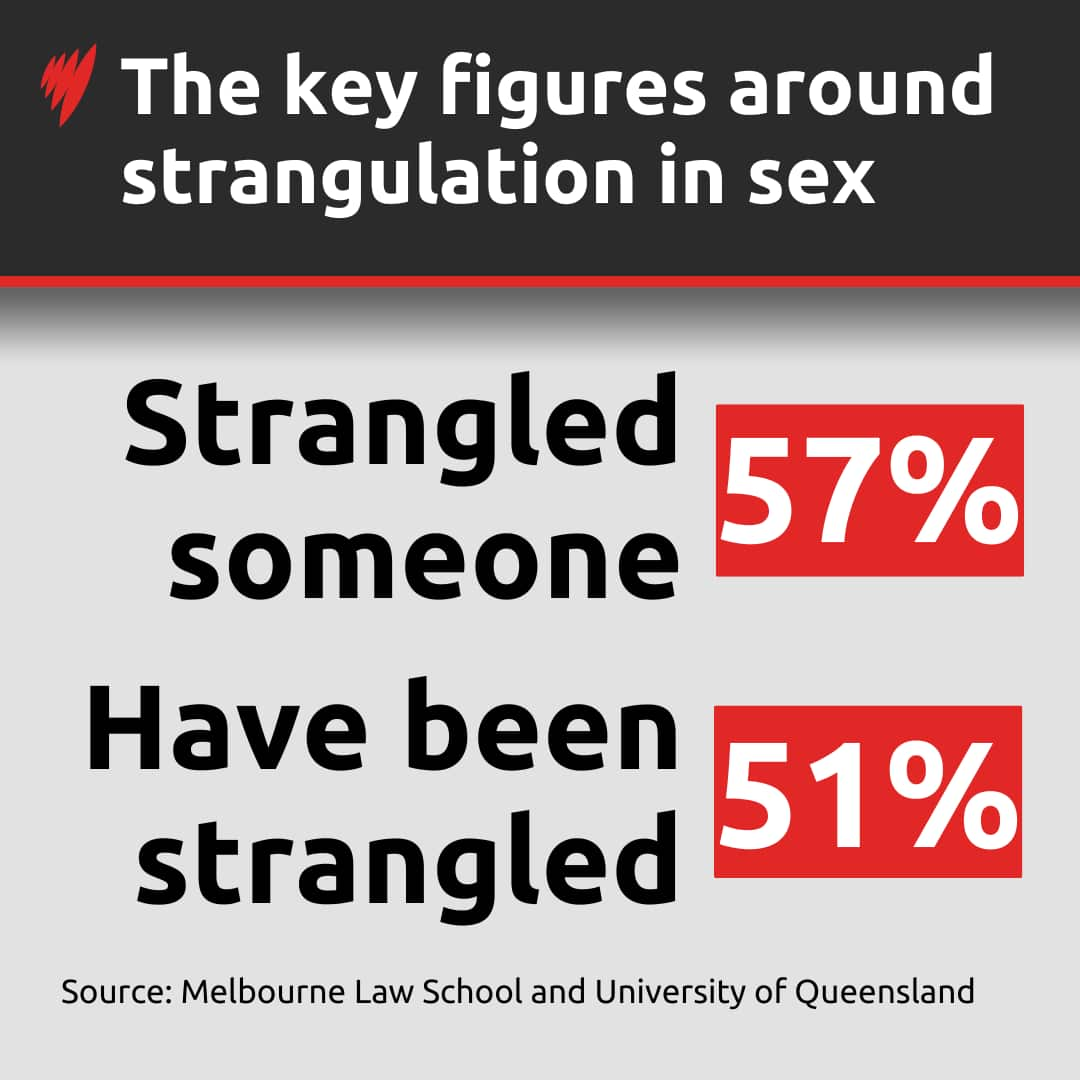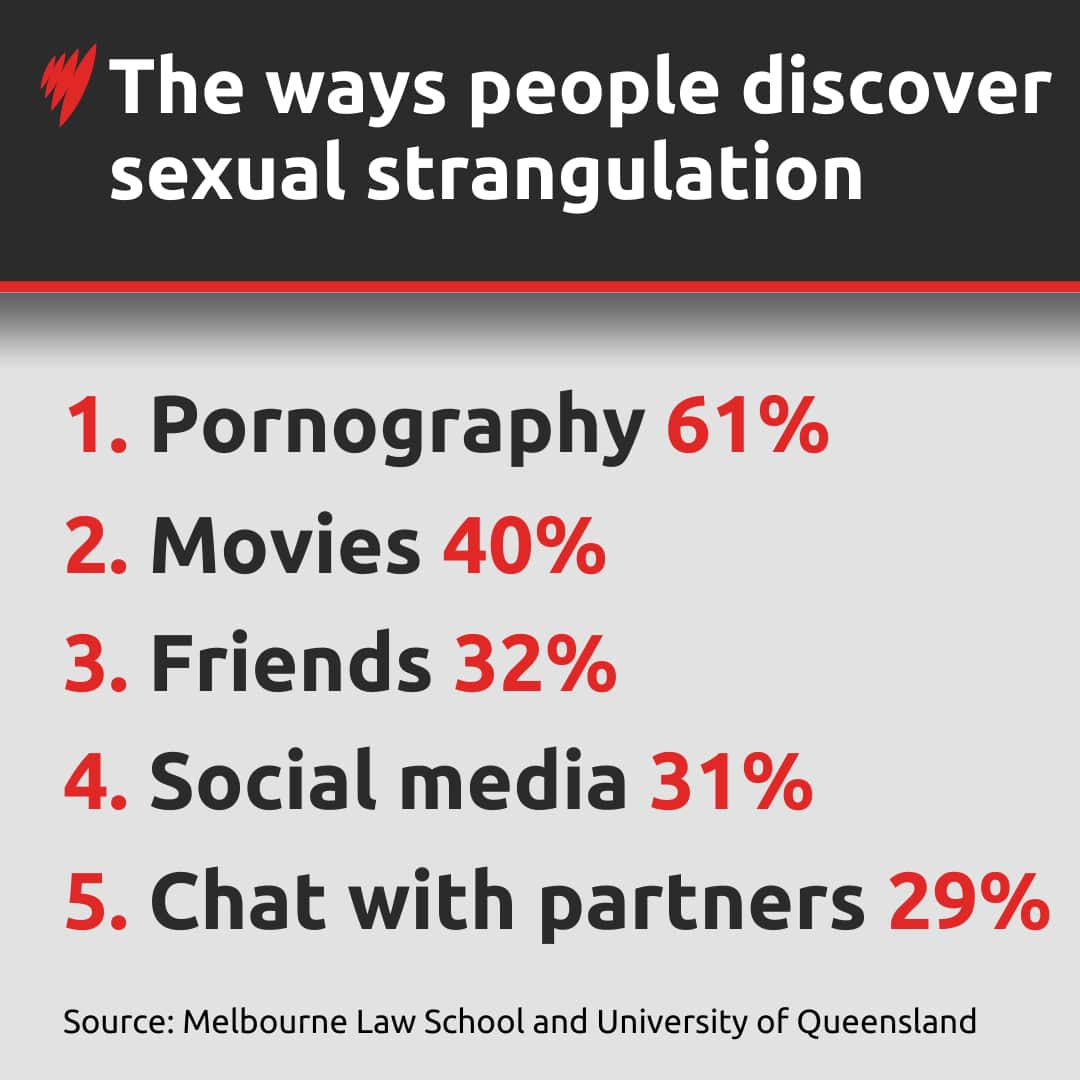This article contains references to domestic violence and sexual assault.
Six in 10 young Australians have been strangled during sex, the first survey of its kind has revealed.
It’s a leading precursor to intimate partner homicide, but when it happens in the bedroom it’s seen as a common ‘kink’.
Nearly 5,000 Australians between the ages of 18 and 35 were asked about strangulation during sex, and the research also revealed just over half had strangled a partner at least once.
The study explored the rate of strangulation in sex
It found more women than men reported being strangled and rates were higher among trans and gender-diverse respondents.
Most said they found out about strangulation through pornography.
More than six in ten of those surveyed found out about sexual strangulation from pornography.
Professor Heather Douglas, the study’s co-author and a family violence researcher at Melbourne Law School, said she started the study after identifying “slippage” between consensual and non-consensual strangulation among women experiencing domestic violence.
“If you’re experiencing coercive and controlling behaviour over a long time and experiencing non-consensual strangulation and then in your sex life you’re suggesting it’s consensual … maybe there’s some pressure being placed on you to accept,” Douglas said.
Can there be informed or affirmative consent if you don’t know the risks?
In some cases, people reported consenting once to strangulation during sex and their partner interpreted that as ongoing consent.
“We’ve just accepted it as part of our sexual reality as young women. I don’t think there’s a single one of my friends … who’ve said that they haven’t at least once been un-consensually choked or slapped,” one participant said in a new education campaign on sexual strangulation run by violence prevention program It’s Time We Talked.
I don’t think there’s a single one of my friends … who’ve said that they haven’t at least once been un-consensually choked or slapped.
CEO Maree Crabbe said she wants to address pornography’s influence on sexual expectations, as well as the often flimsy line between consensual and non-consensual strangulation.
“Young people conveyed the idea that as long as it’s consenting then it’s all okay, even if it’s something that they’re not that into, so we thought it was really important that we are having conversations as a society about pornography’s role in shaping those norms and expectations,” Crabbe said.
“Sexual norms that are a red flag for intimate partner homicide and a significant cause of death in intimate partner relationships.”
What are the risks?
Most of those surveyed did not know consensual strangulation could cause injuries including brain damage, thyroid problems and miscarriages.
“Seeing stars or feeling that sort of head rush as your breath is allowed back into your brain, that is really dangerous and may be causing a brain injury,” Douglas said.
“It’s cumulative, so the more times you’re doing this the worse your brain injury will become.”
Studies in the US have shown those who have been strangled regularly or recently during sex showed changes in their brain structure, memory loss and difficulty in problem-solving.
Education is key
Those working in women’s health want to encourage conversations and awareness about the physical impacts of strangulation.
Denele Crozier AM, CEO of Women’s Health NSW, is spearheading the It Left No Marks initiative.
“50 per cent of all strangulation has no signs and symptomology you can see,” Crozier said.
“Even though women may have had headaches, feel dizzy, find themselves a bit forgetful or groggy, they’re not associating it because they look alright.”
Crozier said many women don’t recognise that what they were experiencing was ‘strangulation’, as they associated that word with someone attempting to injure or kill.
More women reported being ‘strangled’ when services changed the way they asked the question.
“We changed the question to ‘Have you had any experience as where you felt you couldn’t breathe even during sex?’ Now that has made the difference,” Crozier said.
If you or someone you know is impacted by family and domestic violence or sexual assault call 1800RESPECT on 1800 737 732 or visit .
In an emergency, call 000.
Women from migrant and refugee backgrounds who are experiencing family or domestic violence can contact inTouch, the Multicultural Centre Against Family Violence on 1800 755 988 or visit .
, operated by No to Violence, can be contacted on 1300 766 491.


